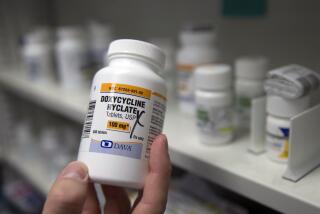Novel Approaches to Combating STDs
- Share via
In the search for chemical agents to battle sexually transmitted diseases, scientists are following a number of novel approaches. Some of the products in the research pipeline include:
* ReProtect, a Baltimore firm, is developing a gel that would create an environment inhospitable to HIV when applied in the vagina. The product, called BufferGel, is also designed to create a barrier that can inhibit the transmission of bacteria and viruses into vaginal tissue. BufferGel is now in late-stage human clinical trials. Animal studies have shown the substance is effective against HIV, human papilloma virus and chlamydia. It does not appear to be effective against gonorrhea.
* A Cambridge, Mass., company, Procept Inc., is developing a gel that would work similarly to anti-retroviral drugs that disrupt the replication of the HIV virus once it enters cells. It could work in a similar fashion to block other viruses, such as herpes.
* Biosyn Inc., of Philadelphia, is conducting early clinical trials of a gel microbicide. The compound is based on research on molecules known as C31G, which have shown effectiveness for killing pathogens by attaching to their membranes.
* The nonprofit Population Council has developed a product made from carageenan, a substance derived from seaweed that is commonly used as a food additive. The substance is a gel that is designed to coat the vaginal tissues and act as a barrier against pathogens. The product is being studied in women in South Africa and Thailand.
* Epicyte Pharmaceuticals in San Diego is pursuing a novel technology--known as plantibodes--which involves manufacturing human antibodies against HIV and other pathogens. Researchers have been able to isolate particular antibodies and then produce them in large quantities by growing them in genetically engineered plants.
Universities and small biotechnology companies are exploring other microbicide technologies. Some of the other approaches include:
* Attachment inhibitors. These are substances that might be used to stop infections by stopping pathogens from binding to cells.
* Antibiotic peptides. These are small protein molecules that are the body’s first line of defense against infection. If applied in high concentrations at the site of infection, the peptides might be able to kill pathogens before they infect cells.
* Lactobacillus Crispatus. This is a bacteria that normally inhabits the vagina to keep it healthy. It is also being investigated as a substance that could make the vagina inhospitable to invaders.





